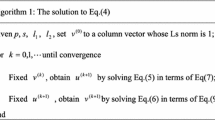Abstract
The merging problem for principal subspace (PS) models is considered in the form: given two principal subspace models \(\mathcal M_i\) for independent training data sequences, assuming that the original data is not available, find the subspace model for the union of the original data sets. The principal subspace merging (PSM) algorithm and its approximated version (APSM) are proposed to solve the problem. The accuracy and the complexity of the approach has been mathematically analyzed and verified on face image models. If data vectors are modeled by projections into a linear subspace of dimension r in N dimensional feature space then the algorithm has O(r(4N 2+13r 2)) time complexity.
Access this chapter
Tax calculation will be finalised at checkout
Purchases are for personal use only
Preview
Unable to display preview. Download preview PDF.
Similar content being viewed by others
References
Information technology - Multimedia content description interface - Part 3: Visual, Part 8: Extraction and Use. ISO/IEC FDIS 15938-[1-8]:2002 (E) (2002)
Bober M., Description of MPEG-7 Visual Core Experiments, ISO/IEC JTC1/SC29/WG11, report N4925, Klagenfurt (July 2002)
Chan, T.F.: Improved Algorithm for Computing the Singular Value Decomposition. ACM Transactions on Mathematical Software 8, 72–83 (1982)
Jolliffe, I.T.: Principal Component Analysis. Springer, New York (2002)
Golub, G., Van Loan, C.: Matrix Computations. Johns Hopkins University Press, Baltimore (1996)
Author information
Authors and Affiliations
Editor information
Editors and Affiliations
Rights and permissions
Copyright information
© 2003 Springer-Verlag Berlin Heidelberg
About this paper
Cite this paper
Skarbek, W. (2003). Merging Subspace Models for Face Recognition. In: Petkov, N., Westenberg, M.A. (eds) Computer Analysis of Images and Patterns. CAIP 2003. Lecture Notes in Computer Science, vol 2756. Springer, Berlin, Heidelberg. https://doi.org/10.1007/978-3-540-45179-2_74
Download citation
DOI: https://doi.org/10.1007/978-3-540-45179-2_74
Publisher Name: Springer, Berlin, Heidelberg
Print ISBN: 978-3-540-40730-0
Online ISBN: 978-3-540-45179-2
eBook Packages: Springer Book Archive




